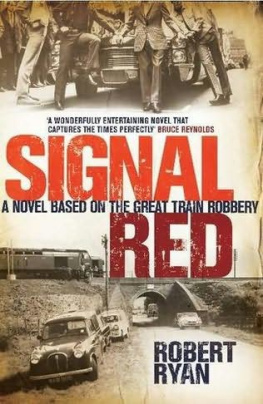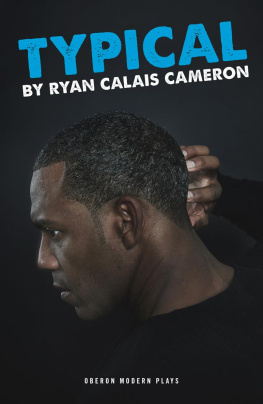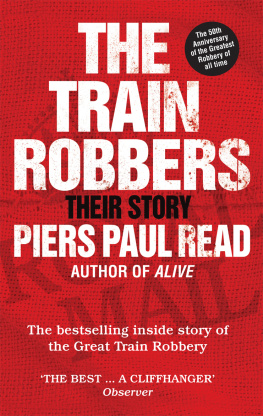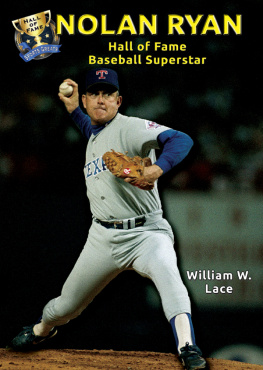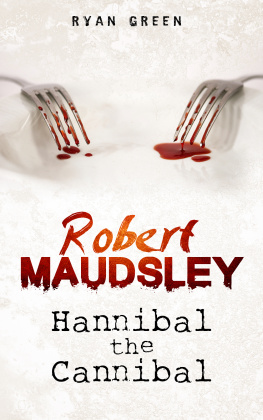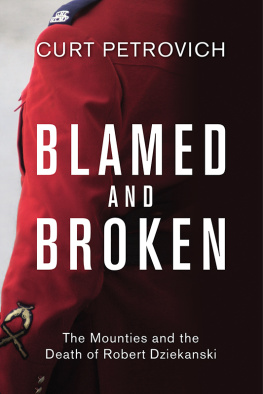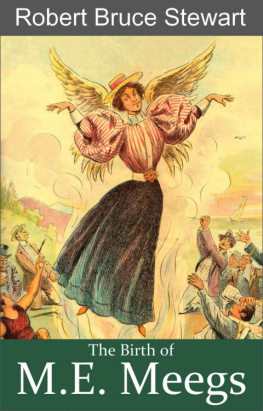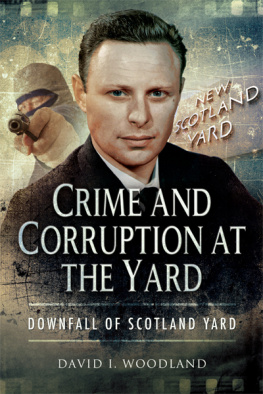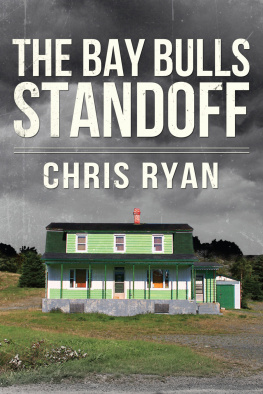For Guy Barker, Michael Brandon and Ian Shaw
Although Signal Red was inspired by and based on real figures and events, the narrative is essentially fiction. Therefore the thoughts, feelings, dialogue and action ascribed to the characters are the author's invention, and Signal Red should be understood to be a fictional account, not history. The narrative contains many characters on both sides of the law who are entirely the creation of the writer, and any resemblance to real people, living or dead, in those cases is entirely coincidental.
A broad definition of crime in England is that it is any lower-class activity that is displeasing to the upper classes.
David Frost and Anthony Jay, To England with Love
Extract from An Honest Citizen's Guide to the Criminal Classes by Colin Maclnnes
Which is the criminal aristocracy?
Safe-blowers, accomplished breakers and enterers, robbery with violence men and reliable 'get-away' drivers.
Have professionals characteristics in common?
To generalise, they are above average intelligence, with good nerves, loyalty (they have to be - to 'grass' is the only real criminal crime), cheerful and humorous and not particularly vicious, outside the job.
Why are there fewer women criminals?
The girls (and women) participate all right but as an informant put it - 'they make the tea while the men get on with the job'.
Are there criminal areas of London?
Yes, just as Marylebone is for doctors, Mayfair for advertisers and Holborn for lawyers. South London has, traditionally, a greater criminal concentration than the North.
Are the crimes masterminded?
The notion of there being one individual who sits like a spider in his web and plans it all, but does not participate, is quite unreal. On the other hand, there are many 'jobs' - and big ones - about which the initial information that makes them possible comes from a man or men with a considerable front of respectability, and whose role is to supply vital facts, but not do the actual job.
What are the relations between criminals and the police?
Intimate. They are enemies, yes, but in relation to anyone who is neither a villain nor a copper, they form a closed society, rather like soldiers of two warring armies in relation to the larger mass of civilians.
Sunday Times Magazine, 1963
Prologue
Blackheath, South London, May 1992
Iwas aware of the blue flashes on the bedroom ceiling even before the telephone rang. I felt a cold cramp grip my insides, although my brain told me I was being ridiculous. How could they have come for you? I asked myself. After all this time? Christ, Tony, even your VAT is up to date these days. And they don't do raids in the wee small hours for VAT anyway. Do they?
I listened to the sounds from outside, muffled by the double- glazin g. There was the bark of a police controller on the radio, the distorted voice interrupted by stabs of static; a motor was still running, at idle, but hunting slightly. I thought the Met was meant to look after their vehicles? Maybe they had privatised their maintenance departments, outsourced to the lowest bidder. And look at what you got. Revs that rose and fell at random.
The bedside phone chirruped the annoying tone set by my wife, Jane, jolting me out of my ruminations on free market forces. It sounded like a sparrow being strangled. She claimed it was less of a shock to the system than an ordinary ringing tone if a call came while you were asleep. Not when police lights were raking the room it wasn't.
'Hello?'
I heard a throat being cleared on the other end of the line. 'Tony? Tony Fortune?'
'Who's this?'
'Bill Naughton.'
I swung my feet out of bed and squinted at the clock. Past one in the morning. My head was clouded by the residual fuzz of the late-night brandy I had downed after taking in part of the Burt Lancaster season at the cinema in Greenwich. I had seen a strange movie called The Swimmer and John Huston's The Unforgiven. Maybe that last title applied to me, too. Perhaps they hadn't forgiven me my youthful misdemeanours. I was aware of Jane stirring behind me, pushing back the duvet, releasing a few stray molecules of last night's perfume. I held out a hand to stop her saying anything.
'Mr Naughton.' Or, more correctly, DC Billy - not Bill - Naughton. At least, that had been his rank when I had known him. 'Been a while. How are you?'
'Retired, Tony Have been for a few years now.'
I looked up at the lights strobing through the curtains. 'Pleased to hear it. So the fact that my bedroom looks like the last dance at the Policeman's Ball is nothing to do with you then?'
He gave the feeble joke an appropriately dismissive snort. 'Well, Tony, I am afraid it is. I'm back, as they say, for one night only, by public demand. Or at least, some Deputy Commander's request.'
I spoke slowly and carefully Was it time to run, at last? At every house and flat I had lived in for the past thirty years I had rehearsed it. My escape route. Out the back, over the garden wall, or onto the roof, along to the neighbour's yard. But now I was too old for that. My running days were over. 'New evidence come to light has it, Mr Naughton?'
'Not about you, Tony.' Was that regret I could hear? 'Fact is, they dragged me from my bed, too. Youngsters are all fresh out of ideas. Need a couple of old hands.'
'Tony? Who?' Jane began, but I shushed her.
'Sorry to disturb you and the missus, Tony.'
'What can I do for you exactly, Mr Naughton?'
'It's Roy. He's in a spot of bother.'
Jesus, I thought, so it is the VAT after all. I might have dropped out of the life, but even I knew that a few of the old lads were playing silly buggers with importing/exporting gold Krugerrands and running VAT scams on the deals. 'It isn't my area of expertise.'
'What isn't?'
'Whatever Roy has been up to. I haven't seen him in ... must be ten or more years. Silverstone, it was.'
'He's shot someone.'
Now I was fully awake. The words, though, didn't make sense. 'Hold up. We are talking about Roy James?'
'Yes.'
'Roy James shot someone?' It was so ridiculous I laughed at the very notion. 'Come on, Mr Naughton. That can't be right. He was never'
I almost heard the twang of Naughton's patience snapping. 'He shot his father-in-law, then hit the wife with the gun- butt.'
I was quiet for a moment while I took that in. Roy was never a violent man. He'd made sure he'd stayed away from all that business. The coshings that were sometimes a part of the job had always vexed him. And guns? He'd ran a mile from them. 'I'll be damned.'
'And he'll be shot dead if you don't help. And then, no doubt, he'll be damned. The one and sevens are here.'
'Who?'
'PT Seventeen,' he explained carefully, as if only just remembering I wasn't up on the latest jargon. 'Tactical Firearms Squad - the boys with the Heckler and Kochs and what have you. Roy's barricaded himself in the house. So they want friendly voices to talk some sense into him before they are forced to go in guns blazing. And believe you me, these lads don't take much forcing.'
'How's the father-in-law?'
'How do you think? In a lot of pain. But he'll live.'
That was something. If it had been murder, the armed police would be even more trigger-happy. 'So the idea is for you and me to talk Roy down?'
'Yeah. Police and thieves,' he chortled. 'Working together for once.'
'Now, now, Mr Naughton,' I protested.
'Figure of speech, Tony. Forget it. Right - the car is outside, ready to take you to the scene.'
It was then I remembered I had tickets for the FA Cup replay the next day. Arsenal versus Sheffield Wednesday at Wembley, courtesy of BMW corporate hospitality. 'Is there nobody else?' I felt a prickle of shame as I said it.

